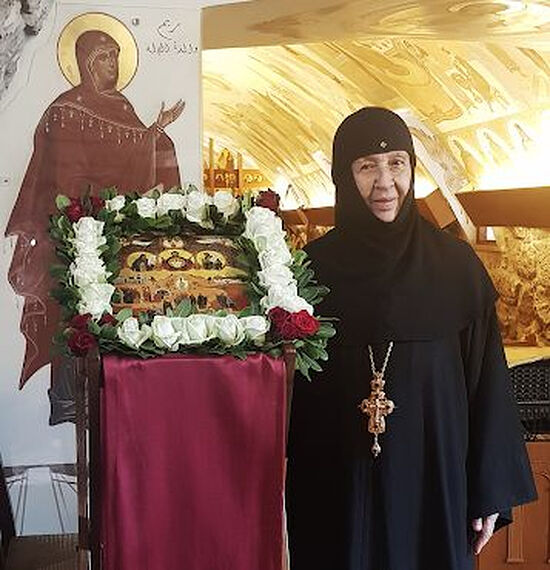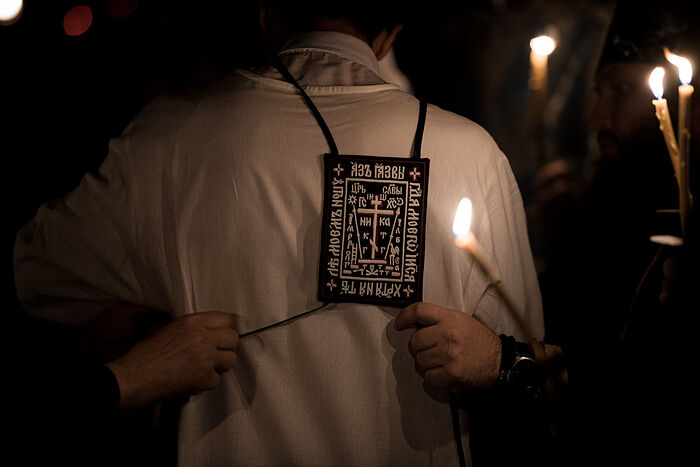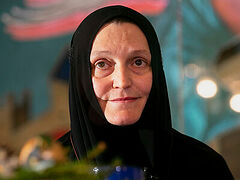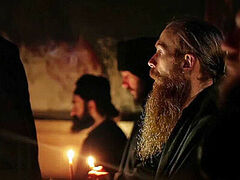Abbess Mariam (Zacca) heads a monastic community in the Archdiocese of Mount Lebanon of the Antiochian Orthodox Church. In her youth, she was spiritually led by Elder Sophrony (Sakharov), who blessed her to found a sisterhood near the village of Douma. Below are her spiritual reflections on loving one’s enemies.
At the door of every house, amidst the nighttime darkness and the heat of the day, in the white frost of dawn, the Lord stands knocking. He says to us: My son, give Me thine heart (Prov. 23:26). He asks for our heart in order to wash it with His tenderness, to warm it with His love, to illuminate its darkness with His light, and to cleanse it with the fire of His love.
He asks specifically for the heart so it might learn the Divine love that it fell away from at the Fall: Learn of Me; for I am meek and lowly in heart (Mt. 11:29), for a heart that is broken and humbled God will not despise (Ps. 50:19). If a man gives himself to God in this way then the Lord will hear him, because his heart wants to be washed, to be cleansed from sin, to love God and neighbor, and his enemy. Such a heart wants to receive the love of God and the Spirit of God, and it receives them through the touch of God, through the grace poured out on it and through its consent to God’s call.
When a man surrenders himself to God to be cleansed from all the defilements of his soul, body, and spirit, and to be made a receptacle of the Holy Spirit, he begins to follow the long and narrow path of love throughout his entire life. Beloved, this can only be realized through the strict observance of the Gospel commandments throughout our entire lives. This is the work of a Christian’s whole life, and there is no other work that would be more noble, more difficult, and more luminous.
The love that is required of us is the love that takes us out of the narrow confines of our “I” so we can see God in our brother, neighbor, and friend. But the Lord expects more from us, because God’s love knows no bounds. In addition to loving Him and neighbor, He asks us to love our enemies.
What is the meaning of Christ’s commandment to Love your enemies (Mt. 5:44)? Why did the Lord say: If any man will do His will, he shall know of the doctrine, whether it be of God, or whether I speak of Myself (Jn. 7:17)? How did St. Silouan the Athonite understand this?
God is absolute love, which embraces all of creation in its abundance. God is present as love even in hell. By giving man a true knowledge of his love as far as he is able to receive it, the Holy Spirit thereby reveals to him the path leading to the fullness of his existence. Those who have attained the Kingdom of Heaven and are in God see in God all the abysses of hell, because there is no place in all of creation that does not know the presence of God. Dwelling in Heaven, the saints also see hell and also embrace it with their love.
Elder Silouan said: “Heaven and all the saints live by the Holy Spirit, and nothing in the whole universe is hidden from Him. Those who hate their brother and reject him belittle their own existence. Such people have not come to know the true God, Who is all-encompassing love, and have not found the path that leads to Him.”
The commandment of Christ to love your enemies is a reflection of the perfect love of the Triune God in this world; it’s the cornerstone of our entire Orthodox teaching. It’s the final synthesis of our all theology, that we might have life, and … have it more abundantly (Jn. 10:10). This is what St. John the Baptist says about it: He shall baptize you with the Holy Spirit, and with fire (Mt. 3:11). The commandment to love your enemies is that fire that the Lord came to bring to earth; it’s the Kingdom of God within us, come with power (Mk. 9:1); it’s our likeness to God.
However wise, learned, and noble a man may be, if he doesn’t love his enemies, that is, every person, he hasn’t yet known God. And on the other hand, no matter how simple, poor, and ignorant a person may be, if he bears this love in his heart, then he dwelleth in God, and God in him (1 Jn. 4:16). To love our enemies with compassion is impossible without God Himself, said St. Silouan. The bearer of such love partakes in eternal life and has an undoubted testimony of it in his soul. Such a man becomes a dwelling place of the Holy Spirit and a friend of Christ.
Beloved, these words are very difficult to apply in our daily lives, in the community we live in, even if it’s a monastic community, and more so in the world. What then is the solution? All have sinned, and come short of the glory of God (Rom. 3:23). But the glory of God was revealed on the Cross. This is why a man must remain submissively on the Cross of Christ every minute of the day and night, and then God won’t leave us.
I’m not going to go into the mystery of pain here, when, like Christ, we crucify ourselves even for the sake of those who don’t love us. For the face of my Christ is my refuge, His Gospel my food, and the fulfillment of His commandments my life. Thus, in crucifying himself, man leaves the realm of the reasonable and possible for the Divine, for the discovery of the Kingdom of God already here on earth, and enters into that life that none can embrace. But first he must repent and tearfully pray for his sins. Such a man seeks how to please his Lord and spends his life in tears and prayers, because he understands that his heart is unclean, weak, self-willed, full of pride, and devoid of the ability to love truly. Such a man begs God to teach him to love…






